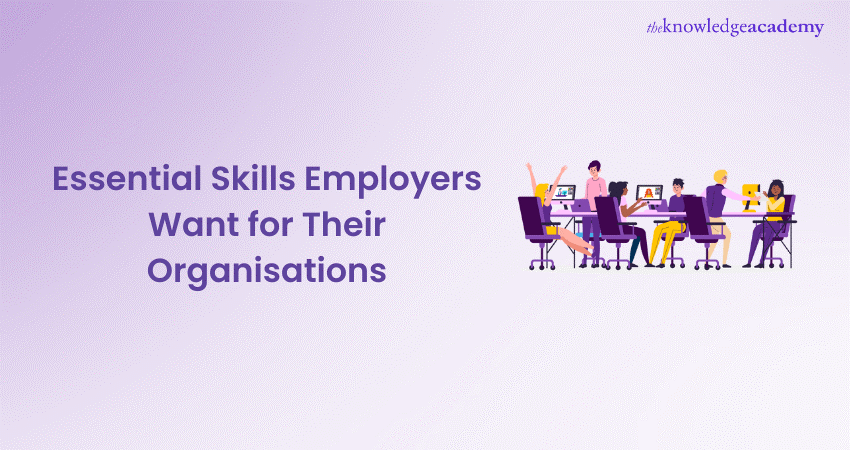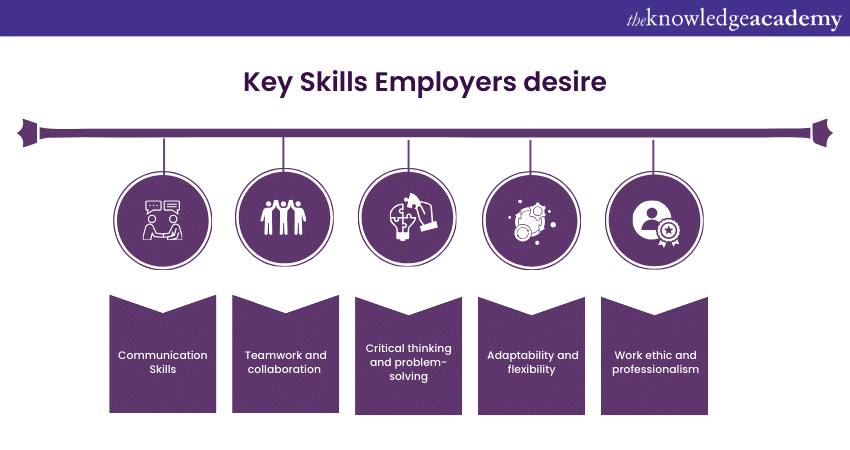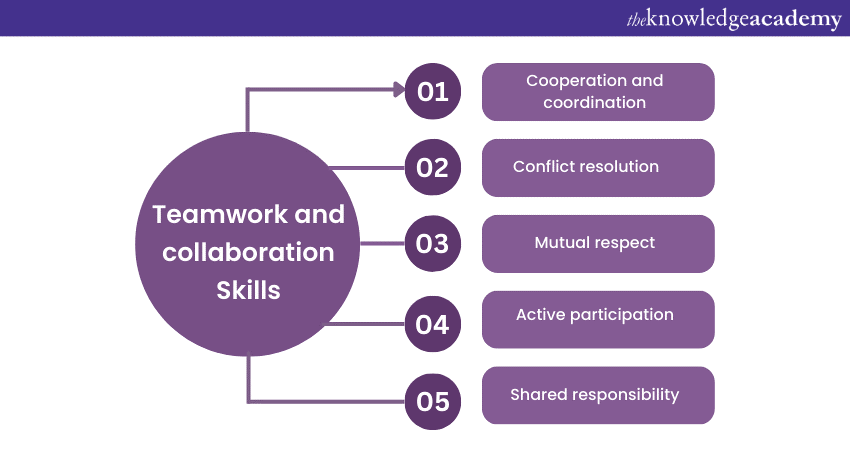We may not have the course you’re looking for. If you enquire or give us a call on 01344203999 and speak to our training experts, we may still be able to help with your training requirements.
Training Outcomes Within Your Budget!
We ensure quality, budget-alignment, and timely delivery by our expert instructors.

In this competitive job market, possessing the right Skills is crucial for both new job seekers and employees looking to advance their careers. Individuals who can demonstrate both technical as well as soft Skills are the ones getting prioritised over other candidates. There are a few essential Skills Employers Want for their organisations.
More than technical Skills, there are specific soft Skills that are in demand in today’s global job market. Employers increasingly recognise that an employee's capacity to communicate effectively, collaborate seamlessly, think critically, adapt to change, and maintain a strong work ethic are essential to organisational success. In this blog, you are going to learn about these Skills Employers Want in an individual so that they can be a great asset to the organisation and contribute to their growth.
Table of Contents
1) Understanding the Skills Employers seek
2) Key Skills Employers desire
a) Communication Skills
b) Teamwork and collaboration
c) Critical thinking and problem-solving
d) Adaptability and flexibility
e) Work ethic and professionalism
3) Conclusion
Understanding the Skills Employers seek
Employers today are looking for candidates who possess exceptional interpersonal Skills, enabling them to collaborate effortlessly in multicultural environments. Critical thinking abilities are highly valued, as employees capable of analysing complex situations and devising creative solutions are indispensable assets. Adaptability is another key trait, reflecting an individual's capacity to navigate change and thrive amidst uncertainty, a crucial quality in today’s dynamic markets.
Furthermore, emotional intelligence, leadership understanding, and a strong work ethic are increasingly becoming non-negotiables. Employers recognise that these qualities not only enhance workplace productivity and contribute significantly to the overall ethos of an organisation. By comprehending the multifaceted nature of these Skills, you can position yourselves as indispensable contributors, meeting and exceeding the evolving expectations of Employers in the contemporary professional sphere.

Key Skills Employers desire
Understanding the several aspects of soft Skills, emphasising their role in building strong relationships, resolving conflicts, and fostering a collaborative workplace culture, can help you stand out from the rest of the candidates:

Communication Skills
Communication Skills form the cornerstone of effective professional interactions, encompassing the art of conveying ideas, thoughts, and information clearly and succinctly. In the workplace, adept communication goes beyond verbal fluency; it involves active listening, empathy, and the ability to tailor messages to diverse audiences.
Effective communication promotes a collaborative atmosphere, minimises misunderstandings, and resolves conflicts efficiently. In leadership roles, excellent communication Skills inspire and motivate teams, fostering a positive work environment. Moreover, cross-cultural communication Skills are invaluable, enabling professionals to navigate diverse perspectives and bridge cultural gaps.
a) Verbal communication:
Proficiency in articulating ideas verbally ensures that information is conveyed accurately and comprehensively. Whether in team meetings, presentations, or client interactions, individuals with strong verbal communication Skills captivate their audience, fostering understanding and engagement.
b) Written communication:
The ability to craft clear, concise, and persuasive written messages is indispensable in emails, reports, and documentation. Strong written communication Skills ensure that complex information is conveyed understandably, leaving no room for misinterpretation.
c) Active listening:
Active listening includes not only hearing but also understanding the underlying message. Employees who actively listen to their colleagues and clients demonstrate respect and openness, enabling them to respond thoughtfully and effectively, building trust and rapport.
Enhance your communication skills and elevate your career – sign up now for our Communication Skills Training!
Teamwork and collaboration
Teamwork and collaboration are the engines that drive innovation and productivity within organisations. In the contemporary workplace, where projects are often multifaceted and global, the ability to collaborate seamlessly with diverse teams is indispensable. Collaborative teams harness the collective intelligence, pooling together various Skills and perspectives.
Moreover, they create an environment where creativity flourishes, as brainstorming and idea-sharing become dynamic and inclusive processes. In such settings, individuals feel valued, fostering a sense of belonging and loyalty. Consequently, organisations that prioritise teamwork and collaboration witness heightened innovation, increased employee satisfaction, and a resilient, adaptable workforce capable of navigating complex challenges with finesse.

a) Cooperation and coordination:
Effective teamwork begins with cooperation and coordination among team members. Each individual plays a unique role, and understanding how these roles intertwine is crucial. By coordinating efforts, teams achieve synergy, producing outcomes far beyond the reach of any one person.
b) Conflict resolution:
In collaborative environments, conflicts are inevitable. Skilled collaborators possess conflict resolution abilities, addressing disputes professionally and finding common ground. This not only preserves team cohesion but also fosters an atmosphere where differing viewpoints are seen as opportunities for growth rather than sources of discord.
Within teams, leadership is not confined to formal roles; it’s a quality displayed by individuals who inspire and guide others. Influential leaders encourage participation, value team members’ input, and provide direction, ensuring the team stays focused on its objectives.
Elevate your leadership capabilities and drive organisational success with our Leadership Skills Training!
Critical thinking and problem-solving
Critical thinking and problem-solving Skills are the engines of innovation, guiding individuals and organisations through complex challenges and fostering continuous improvement. Critical thinkers analyse situations thoughtfully, evaluating information objectively and discerning patterns that lead to insightful decision-making.
Organisations that prioritise and nurture these Skills encourage a culture of inquiry and continuous learning. Employees empowered with critical thinking and problem-solving abilities approach challenges with confidence, turning obstacles into opportunities for growth. Moreover, these Skills foster adaptability, enabling teams to respond adeptly to ever-changing market dynamics.
a) Analytical thinking:
Analytical thinkers break down intricate problems into manageable components, examining each facet meticulously. By understanding the nuances of a situation, they can identify underlying issues and formulate effective strategies to address them.
b) Creativity and innovation:
Creative problem solvers approach challenges with an innovative mindset, exploring unconventional solutions and thinking outside the box. They draw from a diverse range of experiences and perspectives, encouraging the synthesis of new ideas. Cultivating creativity inspires a culture of innovation, where novel concepts flourish, driving organisations to the forefront of their industries.
c) Decision-making abilities:
Effective Decision-making is the culmination of critical thinking and problem-solving Skills. Decisive individuals assess risks, weigh options, and choose the most suitable course of action. In the face of uncertainty, they remain confident in their choices, leveraging their analytical prowess to make informed decisions that benefit the organisation.
Adaptability and flexibility
Adaptability refers to the willingness to adjust to new conditions and effectively respond to evolving circumstances. Flexibility, on the other hand, involves the ability to bend without breaking, embracing diverse roles and responsibilities, even in unfamiliar territory.
a) Embracing change:
Adaptable individuals view change as an opportunity rather than a threat. They remain open to new ideas, technologies, and methodologies, seamlessly integrating them into their workflows. Embracing change with a positive mindset fosters innovation, allowing organisations to stay ahead in dynamic markets.
b) Learning agility:
Adaptable professionals possess learning agility — the ability to acquire new Skills and knowledge quickly. This enables them to pivot when necessary, staying relevant in industries where advancements occur at a rapid pace. Learning agility not only enhances personal growth but also ensures that organisations remain competitive by harnessing the collective expertise of their workforce.
c) Time management:
Flexible individuals excel in managing their time efficiently. They prioritise tasks, allocate resources judiciously, and adapt their schedules to meet changing demands. This Skill is invaluable in today's multitasking work environments, where the ability to switch gears swiftly enhances productivity.
Want to transform your workplace culture and boost productivity? Then register now for our Effective Employee Engagement Training!
Work ethic and professionalism
Work ethic embodies qualities like diligence, discipline, and a strong sense of responsibility. It is the driving force behind consistent, high-quality work, unwavering focus, and the ability to meet deadlines regardless of challenges.
a) Reliability and punctuality:
A strong work ethic is evident in an individual's reliability and punctuality. Being dependable means fulfilling commitments, delivering results, and consistently meeting expectations. Punctuality showcases respect for colleagues' time, reflecting a professional's responsibility for efficiency and productivity.
b) Integrity and accountability:
Professionalism hinges on integrity and accountability. Upholding ethical standards, even in challenging situations, establishes trust and credibility. Accountable professionals take ownership of their actions, learning from mistakes and contributing to a culture of continuous improvement within the organisation.
c) Positive attitude:
Maintaining a positive attitude, regardless of circumstances, is a hallmark of professionalism. Positivity not only fosters a healthy work environment but also inspires colleagues, enhancing team morale and cohesion. It enables individuals to approach challenges with resilience and optimism, leading to creative problem-solving and innovative solutions.
Want to know how to foster a culture of integrity and responsibility? Sign up for our Ethics in Workplace Training!
Conclusion
By exploring these fundamental Skills Employers Want in this blog, we hope that you can start cultivating these Skills to stand apart from the crowd. Developing these essential soft Skills that Employers want will bring not only your professional growth but also your personal growth.
Learn different recruitment strategies with our Recruitment Training.
Frequently Asked Questions
Upcoming HR Resources – Learn about Human Resources Batches & Dates
Date
 Employee Engagement Training
Employee Engagement Training
Fri 6th Dec 2024
Fri 24th Jan 2025
Fri 28th Mar 2025
Fri 23rd May 2025
Fri 25th Jul 2025
Fri 26th Sep 2025
Fri 28th Nov 2025







 Top Rated Course
Top Rated Course


 If you wish to make any changes to your course, please
If you wish to make any changes to your course, please


